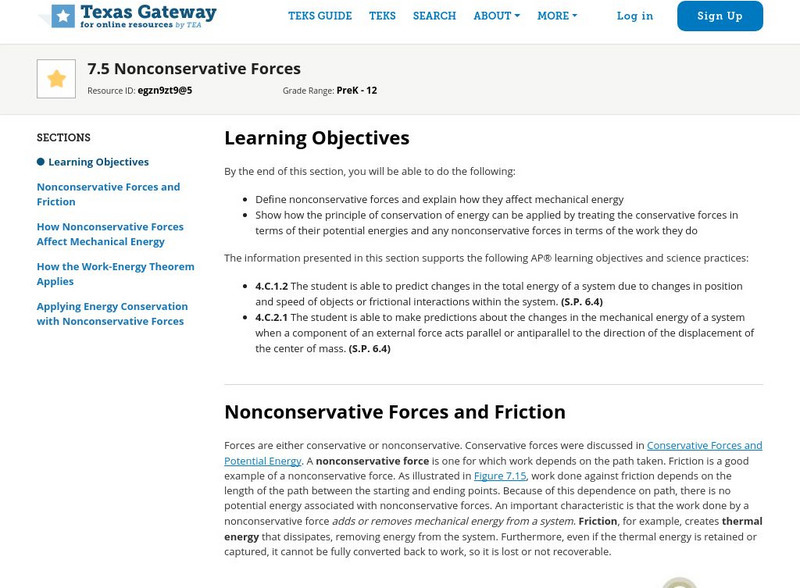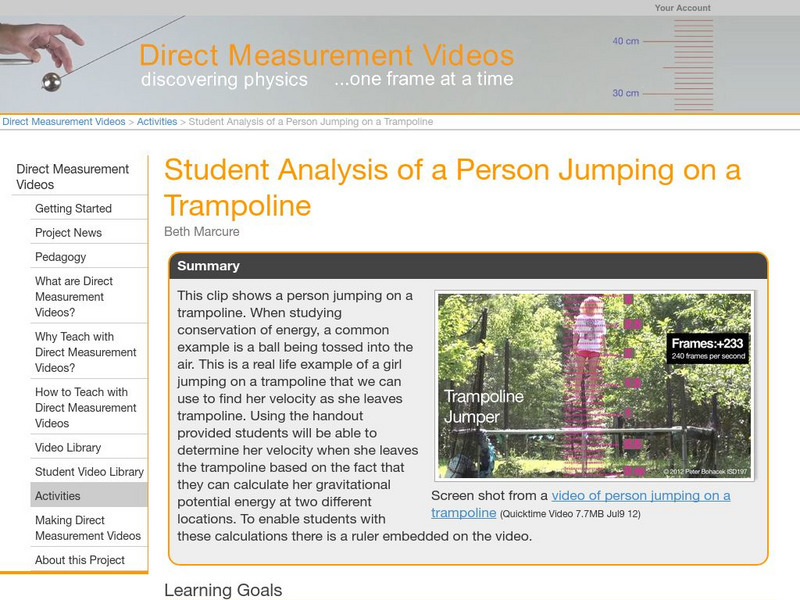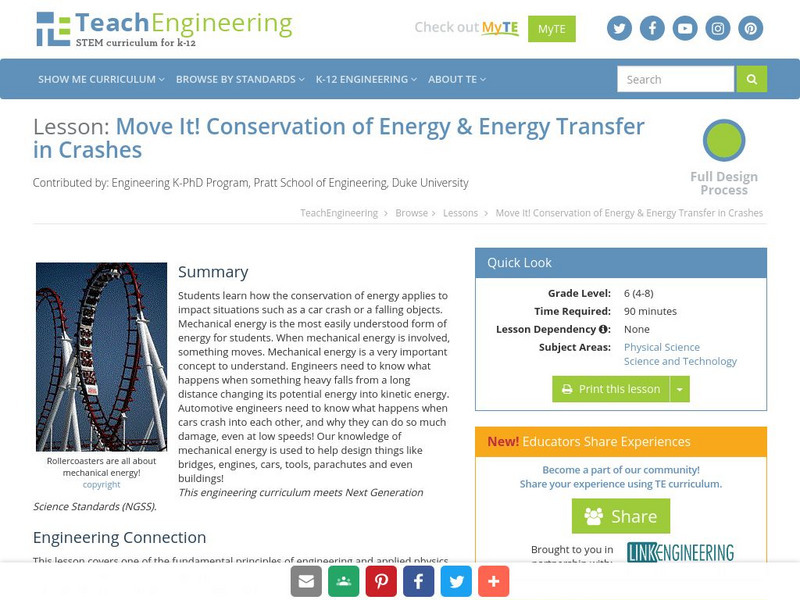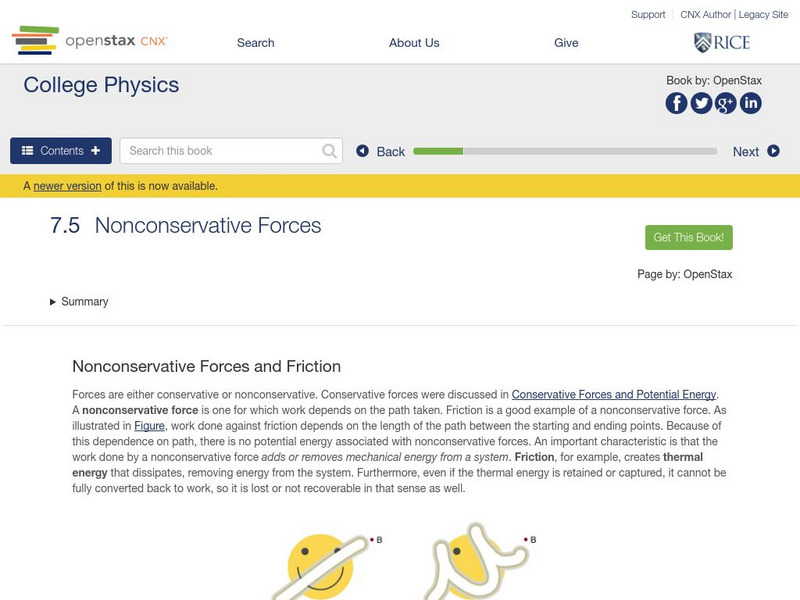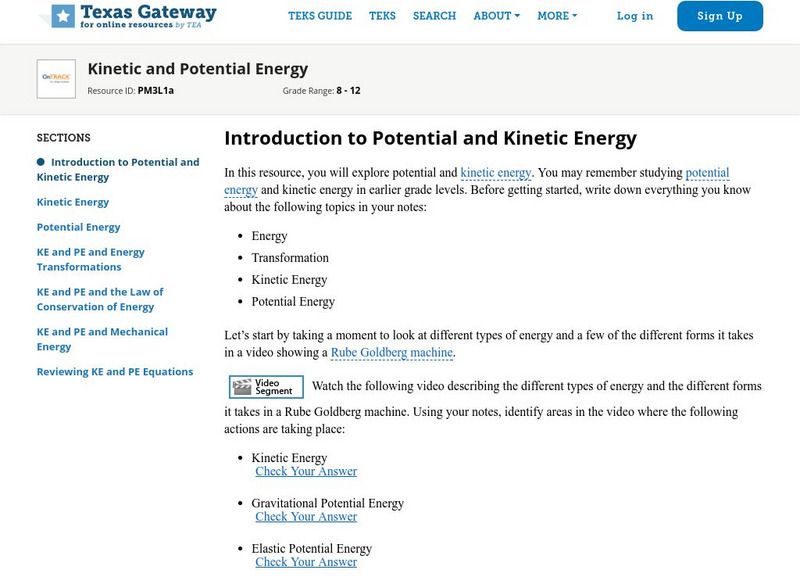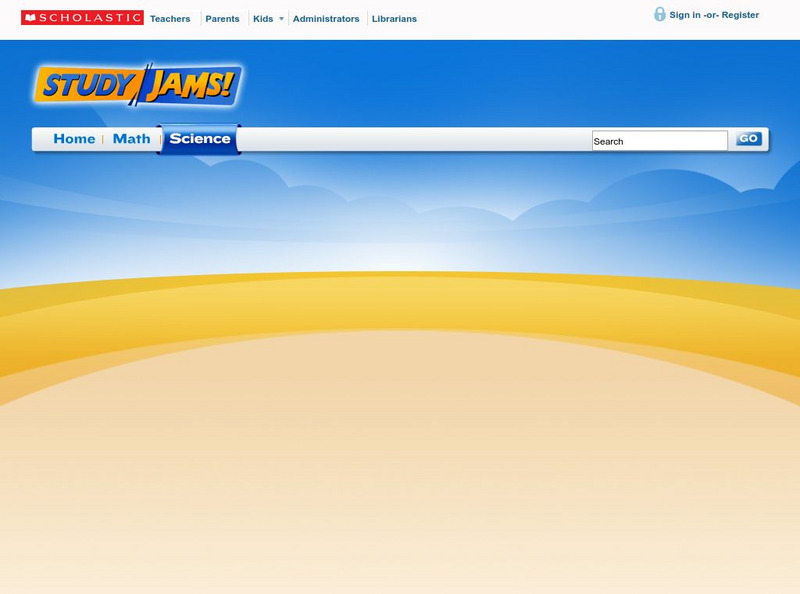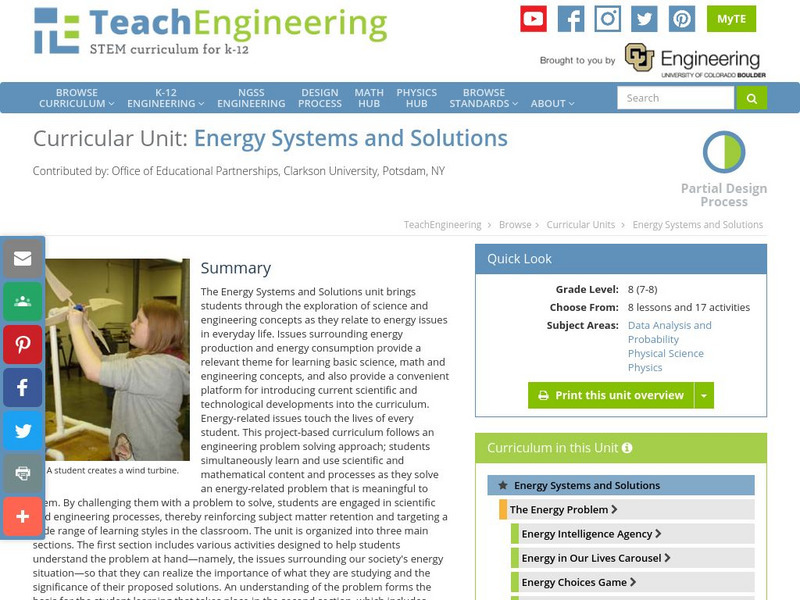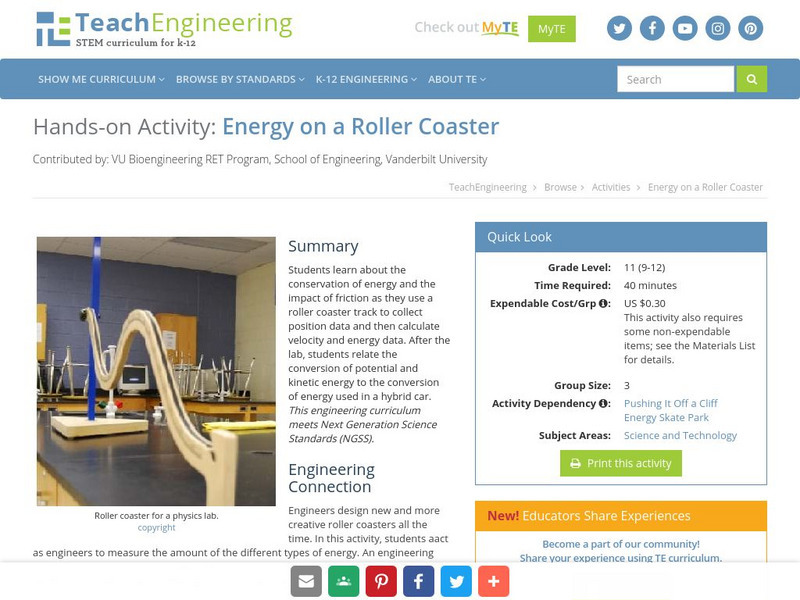Sophia Learning
Sophia: Mechanical Energy: Lesson 4
This lesson will explain how an electric current produces an electric force, which can be used to create mechanical energy. It is 4 of 4 in the series titled "Mechanical Energy."
Physics Classroom
The Physics Classroom: Work, Energy, and Power: Application/practice Questions
Through illustrated examples and practice problems, students apply the relationship between work and mechanical energy change to a variety of motion scenarios in order to test our understanding.
Texas Education Agency
Texas Gateway: Nonconservative Forces
By the end of this section, you will be able to define nonconservative forces and explain how they affect mechanical energy, and to show how the principle of conservation of energy can be applied by treating the conservative forces in...
Science Education Resource Center at Carleton College
Serc: Student Analysis of a Person Jumping on a Trampoline
For this activity, young scholars learn about conservation of mechanical energy as they measure the velocity of a girl jumping on a trampoline using a direct measurement video with an embedded frame counter and ruler.
Physics Classroom
The Physics Classroom: Work and Energy: Energy Transformation on Roller Coasters
Using a roller coaster as an example, the transformation of mechanical energy from the form of potential to the form of kinetic and vice versa is explained and illustrated in the animation.
TeachEngineering
Teach Engineering: Move It!
Mechanical energy is the most easily understood form of energy for students. When there is mechanical energy involved, something moves. Mechanical energy is a very important concept to understand. Engineers need to know what happens when...
PBS
Pbs Learning Media: Mechanical Waves
Learn about mechanical waves, which transfers energy from one place to another through liquids, gases and solids, with this interactive instructional activity.
OpenStax
Open Stax: Nonconservative Forces
In the following interactive students will begin to define nonconservative forces and explain how they affect mechanical energy. They will show how the principle of conservation of energy can be applied by treating the conservative...
Other
Mechanical Systems
A collection of resources on how humans use machines and tools to meet their needs. Covers simple and complex machines, subsystems that transfer forces, mechanical advantage, speed ratio, the effect of friction, efficiency, the science...
Texas Education Agency
Texas Gateway: Kinetic and Potential Energy
Given diagrams, illustrations or relevant data, students will identify examples of kinetic and potential energy and their transformations.
University of New South Wales (Australia)
University of New South Wales: School of Physics: Physclips: Energy and Power
Learn about energy and power in this learning module that contains videos and animation.
Texas Education Agency
Texas Gateway: Forms of Energy
Given diagrams, illustrations, or descriptions, students will identify the types of energy.
FT Exploring
Ft Exploring: What Type of Energy Is It?
How many types of energy are there? Are there many forms of energy, such as electrical, mechanical, and chemical? Or are there really just two types of energy - kinetic energy and potential energy? Here you can learn about these...
Scholastic
Scholastic: Study Jams! Science: Matter: Energy & Matter
A video and a short quiz on the different forms of energy, and how energy moves or changes matter.
CK-12 Foundation
Ck 12: Physical Science: Forms of Energy
[Free Registration/Login may be required to access all resource tools.] Introduction to the seven different forms of energy.
CK-12 Foundation
Ck 12: Physical Science: Forms of Energy
[Free Registration/Login may be required to access all resource tools.] Introduction to forms of energy including the seven different forms.
Physics Classroom
The Physics Classroom: Work and Energy: How High Will It Go?
This animation depicts the motion of a young child sliding across the snow on a sled. Students can analyze the work and energy involved in this scenario.
Physics Classroom
The Physics Classroom: Work and Energy: Stopping Distance of a Hot Wheels Car
Students can analyze an animation of a Hot Wheels car and use the principles of work and energy to answer the given questions.
TeachEngineering
Teach Engineering: Energy Forms and States Demonstrations
Demonstrations explain the concepts of energy forms (sound, chemical, radiant [light], electrical, atomic [nuclear], mechanical, thermal [heat]) and states (potential, kinetic).
Georgia Department of Education
Ga Virtual Learning: Physical Science: Work and Energy
Find out about simple machines, calculate the mechanical advantage and efficiency of machines, differentiate potential and kinetic energy, and learn ways to use energy more efficiently.
Georgia Department of Education
Ga Virtual Learning: Special Relativity and Quantum Mechanics
In this interactive tutorial students explore special relativity and quantum mechanics. Learn basic tenets of the theory of special relativity and the relationship between mass and energy. Also discover the evidence for the particle...
CK-12 Foundation
Ck 12: The Quantum Mechanical Model
[Free Registration/Login may be required to access all resource tools.] In the following online tutorial students will calculate the wavelength, frequency, and energy of light using Planck's constant and the speed of light. They will...
TeachEngineering
Teach Engineering: Energy Systems and Solutions
The Energy Systems and Solutions unit brings students through the exploration of science and engineering concepts as they relate to energy issues in everyday life. Issues surrounding energy production and energy consumption provide a...
TeachEngineering
Teach Engineering: Energy on a Roller Coaster
This activity utilizes hands-on learning with the conservation of energy and the interaction of friction. Students use a roller coaster track and collect position data. The students then calculate velocity, and energy data. After the...
Other popular searches
- Mechanical Energy With Toys
- Potential Mechanical Energy
- Lesson on Mechanical Energy
- Science Mechanical Energy
- Measuring Mechanical Energy
- Mechanical Energy Formula
- Mechanical Energy Worksheet


